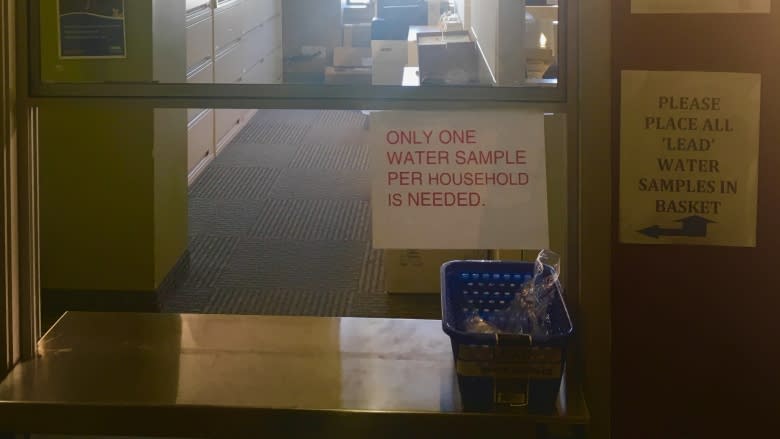Lead levels in Little Italy home's tap water test nearly 5 times the acceptable limit
When Adam Wynne sent in a water sample to test for lead in the pipes of his Little Italy apartment, he expected the element to show up, just not close to five times more than the acceptable limit.
"I did have a suspicion just with the age of the house that there would be some lead," said Wynne, a University of Toronto student. "I was shocked with how high the levels were."
The results from Toronto Water came in at 47 parts per billion. The acceptable concentration of lead is 10 parts per billion, according to Ontario's Ministry of the Environment and Climate Change.
Wynne said the city called him telling him to stop drinking the water, and he told the other tenants in the two-storey house to do the same.
"We've had people living here for over 10 years. They were shocked and a bit upset, and they've gone in for medical testing for lead poisoning," said Wynne.
No law forcing homeowners to change pipes
Wynne says he also contacted his landlord, but found out that there's no law requiring homeowners to change the lead service line that delivers water into their homes, even if the water is no longer safe to drink.
"We are really stuck between a rock and hard place. The onus is wholly on the owners to replace the pipe. Nothing obligates them to," he said.
Service lines are split between homeowners and the city. The section that runs from the property line to the house is the proprietor's responsibility, while the part that connects to the watermain belongs to the city.
Lead service lines were used in homes built before the mid-1950s.
In 2007, council approved a $236 million project to replace the lead pipes connected to 65,000 homes. The job was expected to be done by 2016, but the cost of the project along with hesitancy from homeowners to fork up their share slowed its progress.
Estimated 30,000 homes still have lead pipes
The head of Toronto Water, Lou Di Gironimo, says that replacement strategy is still in place, but is occurring at a reduced rate.
"The reason why we slowed [the replacement program] down, is that sometimes you will see elevated short-term levels of lead when you cut into a pipe and install only a partial replacement," said Di Gironimo.
"We suspect there [are] 30,000 service lines on the city side, which represents about 13 to 15 per cent."
Most of these homes, the city says, are located in older neighbourhoods such as the south Annex, High Park, Lawrence Park and East York.
In 2016, only about two per cent of the 1,456 lead tests conducted came back higher than the maximum acceptable concentration of 10 parts per billion.
However, these tests were voluntary. So concerned residents like Wynne sent their water to Toronto Public Health for testing.
Dangers for young children, pregnant women
According to Health Canada, exposure to even small amounts of lead is particularly dangerous for pregnant women and children under the age of six. It can lead to serious effects on the brain and nervous system.
If residents are worried about lead in their drinking water, Di Gironimo says they can call 311 and ask for a water test.
"We will give them instructions on how to pick up a lead testing kit...We'll provide test results for free and we'll notify the home owner about the results," Di Gironimo said.
The city is going through the different neighbourhoods to replace its side of the service lines and says it provides homeowners with enough notice so they can hire a plumber to complete their side.
If they want to speed up the process, homeowners can call the city and tell officials they're ready to upgrade their side so the work happens simultaneously.
Wynne says he's asked if his landlord will pay the $3,000-$6,000 needed to replace the service line, but hasn't received an encouraging response.
He and his roommates are looking to purchase a filter and are hoping their landlord reimburses them.
"The water is included in our rent here… but it's not safe."
The City of Toronto offers the following tips if you think there's lead in your water:
- Get a free test from one of the six water testing centres in the city or call 311.
- Hire a plumber to examine the service line.
- Let the tap run cold to the touch before drinking from it. This will flush your pipes and make sure the water. is coming from the watermain.
- Use only cold water for drinking, cooking and/or preparing baby formula.
- Boiling water will not remove lead.



